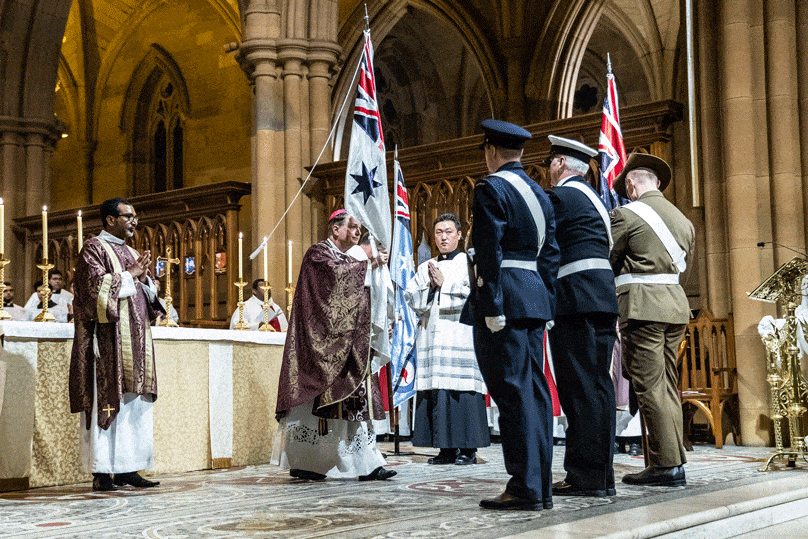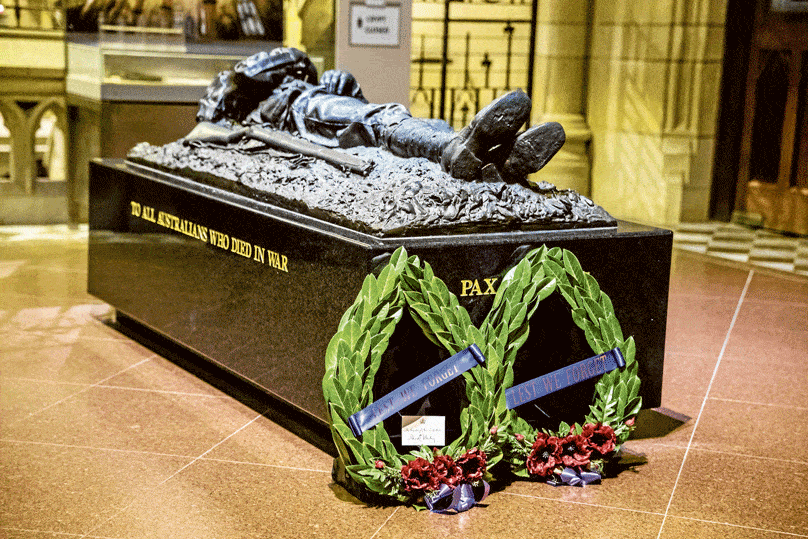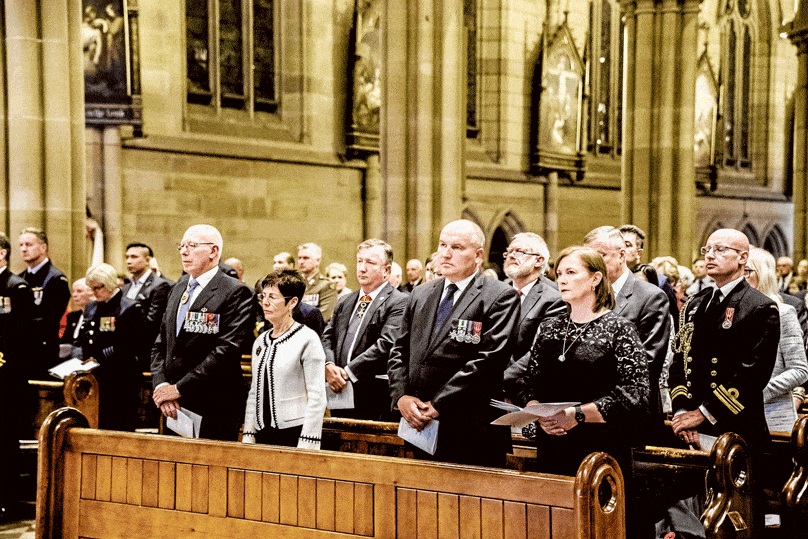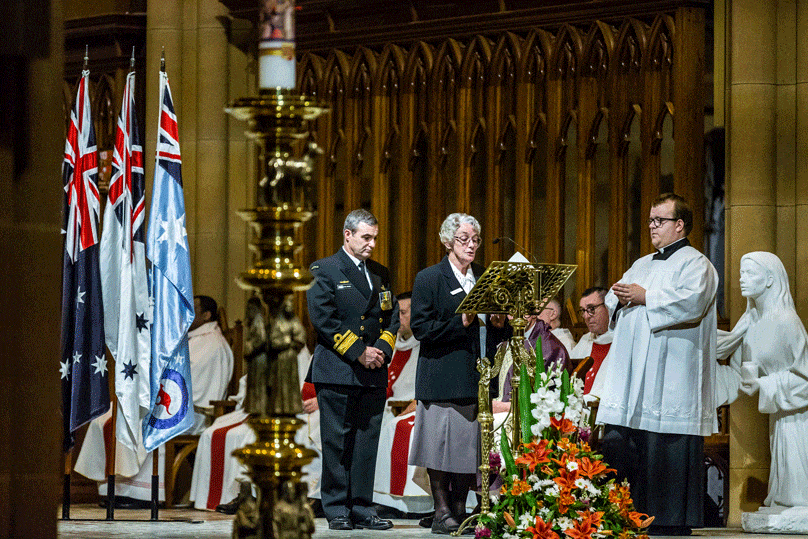
Every year on the Vigil and Day of ANZAC Day we gather to remember and pray eternal life for those who have died in service of this country in any war; to intercede, likewise, for those still damaged by injury or loss in war; to pray that we may never be tested as they were tested; and to recommit ourselves to their worthy ideals.
When our time comes, as theirs did, and indeed as Christ’s did, to say “my soul is sorrowful to the point of death” (Mt 26:38; cf. Jn 12:27), we pray we shall prove worthy of them and of the country for which they fought.
N’oublions jamais l’Australie – Let us never forget the Australians. The instruction is written above every blackboard in the Elementary School in the French town of Villers-Bretonneux.
In a campaign using the slogan “By Diggers defended, by Victorians mended” children from the state of Victoria each donated at least one penny to rebuild the school, with the Education Department matching their funds. The new school was named Ecole Victoria.

Still to this day the Australian flag is flown alongside the French at Villers-Bretonneux and there is an impressive monument to the thousands of Australian soldiers whose bodies were never recovered. Nearby one encounters Rue de Melbourne, Restaurant Kangourou and Pub le Canberra.
Why such devotion to our country in a small French town so far away? Because on this very night, one hundred years ago, two Australian brigades, on the orders of the Allied Commander-in-Chief Marshal Foch, and led by the Australian General Harold ‘Pompey’ Elliott, launched a counter-attack on the German forces that had taken the town the day before. War Correspondent Charles Bean wrote that the Australians didn’t stand a chance: “thoroughly depressed… feeling certain that this hurried attack would fail hopelessly”.
There were many parallels with that night three years before in Anzac Cove. Both required daring in the darkness and the courage to expose troopers to well-armed and entrenched opponents in the dawn light. The difference, however, is that at Viller-Bretonneux the Australians won the day, though at the cost of 1200 Australian lives in a day. One British war correspondent declared it “the most outstanding manoeuvre of the war’, while a German officer present later recalled that the Australians “were magnificent, nothing seemed to stop them”.
N’oublions jamais l’Australie mirrors our Australian saying, ‘Lest we forget’. Taken from the Old Testament Book of Deuteronomy (Dt 4:7-9), popularised in the Christian poem Recessional by Rudyard Kipling, and later set as a hymn, these three words have become a part of the Australian psyche. One of the last remaining uses of the subjunctive mood in English, the word ‘lest’ here says more than simply that we celebrate ANZAC Day so as not to forget; ‘lest’ here stands as a warning, an admonition; we should not, we must not, forget.

Why the warning? Because, to be frank, we are very good at forgetting. It’s a coping mechanism. Too much grief for too long is debilitating for us. And we are easily distracted. Contemporary culture, so little versed in history, so wedded to the latest image or tweet, might be called a culture of distraction. The ordinary human tendency to forget is magnified by modernity.
Yet remembering is also fundamental to humans. Ritual commemorations are found in every culture. In Judaeo-Christian tradition remembrance suggests more than a ritual calling to mind: it makes present that which is remembered and calls forth a response from the participants. In the Ode of Remembrance we undertake to remember them ‘at the going down of the sun and in the morning’ – no doubt in our tears, imaginations and prayers – but surely also in our actions, lives, commonwealth.
Lest we forget. It’s a promise but also a warning: that if we forget them, we demean their sacrifice, dishonour their ideals, harden our own hearts, and lose sight of what makes us human. As the Book of Wisdom (Wis 3:1-9) put it: these virtuous men’s deaths may seem like annihilation but are actually rest in peace, what appears punishment is in fact rewarded with immortality, what looks like a failed test is truly rewarded with a gold medal.
And not only are they remembered, the text suggests, they are our judges: to remember them is to invite comparison, of our generation with theirs, of our ideals, courage, willingness to sacrifice.

We remember them, not just as impersonal humanity but as individuals. Recently friends of mine buried their 96-year-old father and grandfather, Jack Langrell, who served as an Able Seaman on HMAS Australia in the Battle of the Coral Sea. His father John had served in the Royal Australian Navy from 1911 to 1933, including on the first HMAS Australia, and then became a Police sergeant at the Naval Dockyard Garden Island. Jack in turn served from 1938 to 1955 on the second HMAS Australia, as well as HMAS Albatross, HMAS Hobart, HMAS Kanimbla and the third HMAS Sydney.
“Pop” was a man of great faith, warmth and humour, who could see the good in any person or situation. By flaunting his great age and cleverly wearing a golden Irish beret and smile, he managed to get his photo in the papers every ANZAC Day. Greatly loved by his wife, three children, nine grand-children and fellow servicemen, he had a great influence on many.
How many more of our returned service personnel had such an influence or would have had, had they lived? After the war the people of the still ruined town of Villers-Bretonneux erected a memorial to the Aussies who died there on this day one century ago.
The Mayor declared that the people desired “to thank the valorous Australian Armies, who with the spontaneous enthusiasm and characteristic dash of their race, in a few hours chased away an enemy ten times their number… Soldiers of Australia, whose brothers lie here in French soil, be assured that your memory will always be kept alive, and that the burial places of your dead will always be respected and cared for.”
As we entrust our departed veterans to their loving God, we join our French friends this day in declaring that they will never be forgotten. Lest we forget.
This is the edited text of the homily by Archbishop Anthony Fisher OP for the Vigil Mass of ANZAC Day at St Mary’s Cathedral, Sydney, on 24 April 2018.
